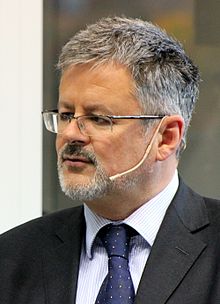Christopher Clark
| Sir Christopher Clark | |
|---|---|

Christopher Clark 2013
|
|
| Born | Christopher Munro Clark 14 March 1960 Sydney |
| Nationality | Australian |
| Institutions | St Catharine's College, Cambridge |
| Alma mater | |
| Thesis | Jewish mission in the Christian state: Protestant missions to the Jews in 18th- and 19th-century Prussia (1991) |
| Doctoral advisor | Jonathan Steinberg |
| Notable awards | Wolfson History Prize |
| Spouse | Nina Lübbren, Lady Clark (art historian) |
| Children | Two sons (with Lübbren) |
|
Website Cambridge Faculty of History page |
|
| Notes | |
Sir Christopher Munro "Chris" Clark (born 14 March 1960) is an Australian historian working in England. He is the twenty-second Regius Professor of History at the University of Cambridge. In 2015 he was knighted for his services to Anglo-German relations.
He was educated at Sydney Grammar School between 1972 and 1978, the University of Sydney where he studied History, and between 1985 and 1987 the Freie Universität Berlin.
He received his PhD at the University of Cambridge, having been a member of Pembroke College, Cambridge from 1987 to 1991. He is Professor in Modern European History at the University of Cambridge and since 1991 has been a Fellow of St Catharine's College where he is currently Director of Studies in History. In 2003 Clark was appointed University Lecturer in Modern European History, and in 2006 Reader in Modern European History. His Cambridge University professorship in history followed in 2008. In September 2014, he succeeded Richard J. Evans as Regius Professor of History at Cambridge. In the Birthday honours of June 2015 Professor Clark was knighted on the recommendation of the Foreign Secretary for his services to Anglo-German relations.
As he acknowledges in the foreword to "Iron Kingdom", living in West Berlin between 1985 and 1987, during what turned out to be almost the last years of the divided Germany, gave him an insight into German history and society.
Clark's academic focus starts with the History of Prussia, his earlier researches concentrating on Pietism and on Judaism in Prussia, as well as the power struggle, known as the Kulturkampf, between the Prussian state under Bismarck and the Catholic Church. From this his scope has broadened to embrace more generally the competitive relationships between religious institutions and the state in modern Europe. He is the author of a study of Christian–Jewish relations in Prussia (The Politics of Conversion. Missionary Protestantism and the Jews in Prussia, 1728–1941; Oxford: Oxford University Press, 1995).
...
Wikipedia
